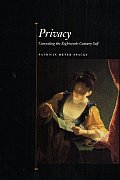 So I began a new book called Privacy: Concealing the Eighteenth-Century Self by Patricia Meyer Spacks -- I chose it because I was looking for interesting books about the eighteenth century, but then I began to realize that the topic is perfect for me to think about right now, having begun this blog only a couple months ago, because I'm sorting through what I think about privacy in a very direct way every time I write a post. Since this book looks at privacy through the lense of literature, largely the novel although including other genres, I'm afraid, reader, that you will be subjected to more quotations about Samuel Richardson. But not today.
So I began a new book called Privacy: Concealing the Eighteenth-Century Self by Patricia Meyer Spacks -- I chose it because I was looking for interesting books about the eighteenth century, but then I began to realize that the topic is perfect for me to think about right now, having begun this blog only a couple months ago, because I'm sorting through what I think about privacy in a very direct way every time I write a post. Since this book looks at privacy through the lense of literature, largely the novel although including other genres, I'm afraid, reader, that you will be subjected to more quotations about Samuel Richardson. But not today.
Oh, sorry -- I just found the quotation I wanted to give you and it's about Clarissa. Okay, you will be endlessly subjected to quotations about Richardson, and I guess you'll have to deal with it. This is Spacks talking about the contradictions in Clarissa's attitude towards privacy:Desiring to slide through life unnoticed, she resolutely separates herself -- physically, as much as she can; psychically, almost completely -- from others ... Yet all eyes are upon her: the eyes of all she encounters, but also, by her prearrangement, the eyes of all who survive her: not only family and friends, but potential readers of the book to be compiled by Belford, for which she also arranges. She wants to slide through life unnoticed; she also wants all eyes upon her. She wants privacy; she wants fame.
This is quite the paradox -- she wants to be alone and wall herself off from others but she arranges her own exposure through writing and reading; she wants privacy and fame both. It sounds a bit like blogging, doesn't it? I write about exactly what I choose to write about, including some personal details and excluding others -- a lot of others -- and thereby I'm preserving my privacy. Sort of. Having a blog means that I'm violating my own privacy to some extent (if such a thing is possible -- if I'm the one doing the violating, is it violation?). I'm both hiding and revealing myself. The thing that amuses me about the picture I put up of myself on the blog a while back is that it's self-revelation -- but not really. It's Clarissa herself who's hiding my face. Clarissa writes and writes and writes -- the novel is made up of letters, a large number from Clarissa herself -- but her character is in a lot of ways still obscure. Writing about oneself can be a way of revealing oneself, but, paradoxically, of shielding oneself too.
I recently came across this post from Tales from the Reading Room, where Litlove describes why she blogs:If I did believe that identity was in fact composed of a myriad assortment of small narratives, and that our sense of self changed with the ebb and flow of the stories we told, wouldn't it be intriguing to watch such a dynamic in action?
The wording here is interestingly ambiguous -- who is intrigued? Watching the "ebb and flow of the stories we told" is intriguing for the writer and for the reader both, the "we" of Litlove's phrase. The writer is discovering things as she writes just as the readers is discovering as she reads. I would add that what's intriguing is not only watching the ebb and flow of a changing and fragmentary identity, but getting the sense of what is not said as well -- of the person that lies behind the posts, undescribed and unrevealed. Making writing public somehow enhances the feeling of depths unexplored, kept private.
Sunday, June 04, 2006
Privacy
Posted by
Rebecca H.
at
9:30 AM
![]()
Subscribe to:
Comment Feed (RSS)



|